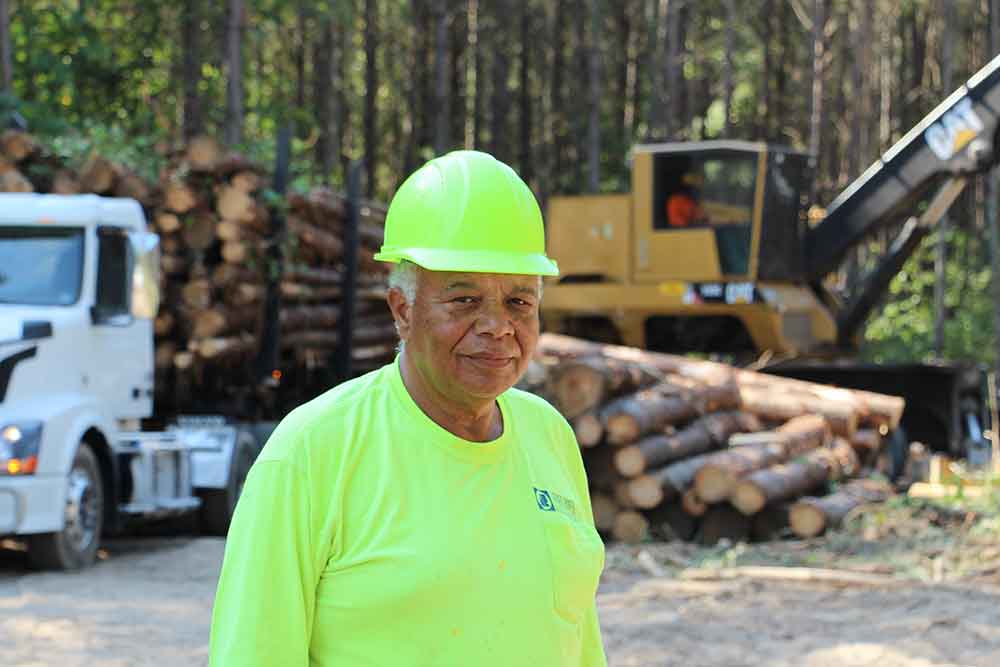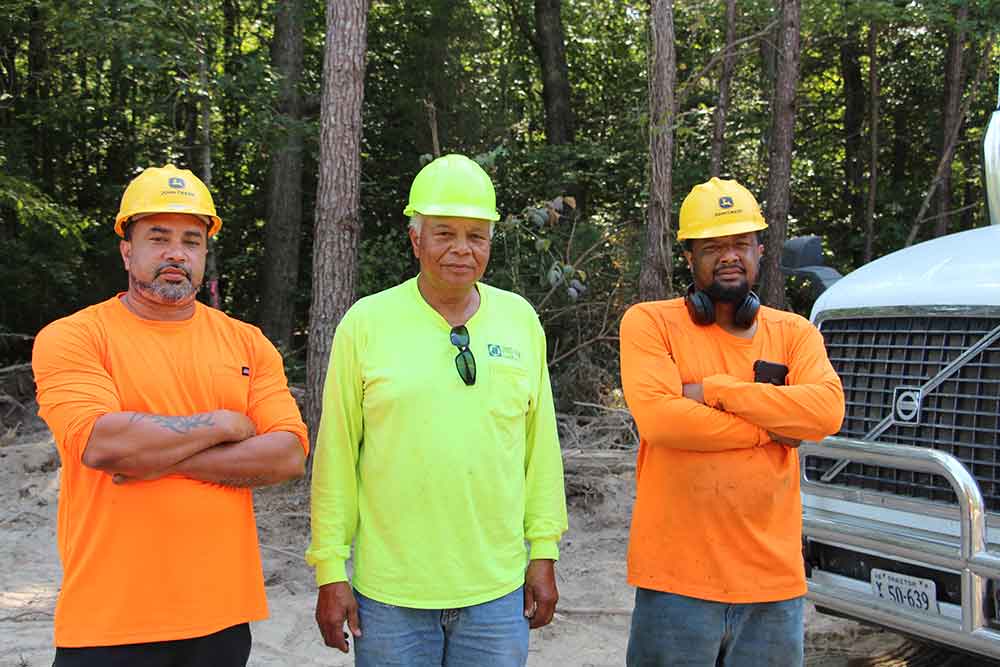By David Abbott, Managing Editor, Southern Loggin’ Times
CHARLES CITY, Va.

He’s still got a few reels to go before his final act, but Linwood Johnson has already had a long and colorful life. A logger from a big family of loggers, Johnson is also a Vietnam veteran and a horse expert who, on the side, works in movies and TV shows. He’s 71 now—“Almost old enough to retire,” he says with a grin; almost, but not quite yet.
Johnson was 19 and fresh out of high school when he joined the Army; rather than wait to be drafted, he volunteered. Hoping that by signing up he’d get to choose his MOS (military occupation specialty). At least, that’s what he’d been told was often the case; it didn’t work out for him. “I volunteered for quartermaster school because they had a quartermaster school in Fort Lee, which is nowhere from me, and I thought maybe I’d get to go there,” he says. Instead, he ended at the quartermaster school in Fort Polk, Louisiana. “When I got there, they had signs everywhere that said, ‘Fort Polk: Stepping Stone to Vietnam.’ That was no lie.”
He enlisted in July 1967, and by December, he says, “I was headed to sunny Vietnam.” He was stationed at Củ Chi, a rural district of Ho Chi Minh City that served as base of operations for the U.S. Army’s 269th Aviation Battalion. The Củ Chi tunnels were also the headquarters of the Viet Cong. His arrival came at a bad time, he recalls. “It seemed so quiet at first, but they were basically lulling everybody to relaxation, getting ready for the Tet Offensive.” The Tet Offensive lasted from January 30-September 23, 1968.

Johnson was at first assigned to an office job: typing, ordering supplies. That didn’t suit him; he’d always been an outdoor person. “They needed someone to load ammo, and I said I could do it. The wreckers had booms, like a knuckleboom loader. I went to the supply department, got and read a manual, and that evening I went out and loaded the ammo.” Having proved himself, he soon found himself in a new job in the recovery section, retrieving heavy equipment from the field. With no formal training in that area, he developed a reputation as a guy who could get the job done and ended up as the unit leader.
He relates one incident as an example: three tanks had set up in a rice paddy and gotten stuck after a heavy rain, and he and his crew were sent to get them out. It took them a while to find the tanks, and when they did, Johnson realized they had a new problem. “I remember the first night,” he says. “I said we had to get off the road because if they (the Viet Cong) came through and saw us, they would just kill us.” His unit had no security, just the four of them on their tank retriever with only their own weapons: two M60 machine guns, a 50 caliber M2 Browning, M16 and a grenade launcher. “If they had come in they would have killed us so easily, it would have been a shame. We would have been sitting ducks.”
Johnson backed the tank retriever up to get some room and then sped it up to attempt to cross the water onto an island in the middle of the rice paddy. “She just did make it,” he says. “The water gave us a little buffer from the road so that if they didn’t see us, I said we might make it till morning.” They waited through the night, trying to sleep and hoping their luck would hold out and the enemy wouldn’t spot them.
Was he afraid? He’s man enough to admit that he was. “You know, you’re always scared in stuff like that,” he says. “You’re basically a child at 19, 20 years old, and now you have your life in your hands, and other people’s lives, too.”
It took two days to pull the tanks out.
“It was a rough go. Those tank retrievers didn’t have but only 200 feet of cable,” Johnson explains. “I called base camp and they flew out a quarter mile of 2 in. cable. Vietnamese Rangers parachuted it in. It took us all of the first day to pull one tank out, and when it was coming out you could see the ground moving on each side for 20 ft. The next day, those Vietnamese Rangers were there with us, so we had security. I did quite a few recovery missions like that. That’s basically what I did the whole time I was there.”
Johnson spent his entire enlistment, after training, in Vietnam—just over two years. After his first year there he put in for a transfer to either Germany (where he had brothers stationed) or anywhere on the East Coast, where he figured he’d have been close enough to visit home—but instead they only offered him a transfer to Fort Riley, Kansas in the winter. “I wasn’t Dorothy and I sure wasn’t Toto,” he says. “Kansas didn’t have anything for me.” So he opted to stay in Vietnam for six more months. When that was done, he tried again for Germany or the East Coast, but this time was only offered a transfer to Ft. Carson, Colorado. Since that also didn’t interest him, he figured that if he did one more tour in Vietnam he would shave five months off of his total commitment, so he spent more time in country to have less time overall. He left for home in February 1970.
How does he feel about the experience, looking back from the safe distance of time? “I wouldn’t do it again but I wouldn’t trade anything for the experience,” he considers. Thinking about the war itself, in the big picture, he says, “With guerilla warfare it is hard to win unless you just take them out, and the U.S. plays by the rules. So we spent a lot of money and it wasn’t a clear victory.”
His own experience, however, was more personal. “I remember one night looking up at the sky thinking about all these guys I grew up with who were looking at that same sky without a care in the world, while we were over there not knowing if we would be alive the next day. It’s hard to explain. I was hoping that something good would come out of it.” What good came of it for him? “It makes you appreciate things, makes you appreciate home.”
Back at home, Johnson wasn’t married yet when he left for the war, but he did leave behind a high school sweetheart, Sandra, whom he married after he returned. He had two older brothers, Stanley and J.T., who were also in the military, both stationed in Germany. He advised his younger brother, Charles, to volunteer, believing the Army usually wouldn’t send two brothers to war at the same time, especially if he volunteered. Unfortunately, Charles didn’t enlist in time, his number got called up and he ended up in Vietnam too. Mercifully, both of them made it home alive and in one piece.
Logging Roots

“We came from a big logging family,” Johnson says. His father, Stanley, was one of 12 children: nine boys and three girls. All the sons were loggers, most had their own businesses; one of the girls married a logger who had his own company.
“When my daddy was living, in the summers we’d go in the woods, and they were loading everything by hand and limbing trees with axes,” Johnson remembers. “The other children were glad for the summer to get here so they’d be out of school. I wasn’t glad because I knew we’d have to go to work.”
Linwood was only 11 when his father was killed in a logging accident in 1959. At that time they pulled logs out with a Farmall Super M tractor. That evening one truck got stuck in a bad spot, and Mr. Johnson took the Farmall to pull it out. The tractor went backwards and ran over him; he died in the hospital a few days later.
After War
“When I was in high school, I said if I ever grow up, I never want to cut another stick of pulpwood as long as I live,” he relates with a laugh. So returning to the woods was not in his post war plans. When he re-entered civilian life, the Army told him that, as a veteran, he’d be the first hired and the last fired. “All they told us and a dollar would get you a cup of coffee—just make sure you got the dollar.”
Johnson soon got a job at a DuPont plant. “Those three swing shifts didn’t bother me a bit because in Vietnam you worked every day,” he says. But after six months, DuPont laid him off. He tried his hand at carpentry for his wife’s uncle, and he liked that and wanted to learn more, but the home building market soon went sour. He then found work at the Ethyl Corp. in Richmond, where he did the same job he’d done at DuPont, but for $1 less an hour—and he had only been making $2 an hour at DuPont. “It looked like things were on a downward spiral,” he thought, with his income reduced by half.
So he went back to DuPont and insisted on speaking with someone in charge. After pointing to the company’s stated policy of preferred hiring for veterans and calling their attention to the fact that he knew non-veterans who kept their jobs when he was laid off, Johnson convinced the company to hire him again. And yet, he says, “Every day I went in, I hated it.” Eventually, he quit, determined to make it on his own.
He started working with two of his brothers, James (J.T.) and Charles, who were already logging together. They worked together for quite a few years and did all right, but by 1981, the Johnson brothers opted to start separate companies. “I haven’t regretted it,” he says. “Things have gotten tight at times but if you stay in it long enough, things turn around. Right now it’s turning around and you can make decent living.”
Uncivil

Johnson has vivid memories of being a black child in the segregated South. “They had water fountains labeled ‘white’ and ‘colored.’ I remember going to Providence Forge to a little diner where blacks could buy food at the window but you couldn’t sit inside and eat.” After integration, he took his future wife to the first interracial prom. “There was more police there than people, looked like. It was not a good time to be black.”
One might think wearing the uniform of the U.S. Armed Forces and volunteering to serve in a war on behalf of his country would have earned him more respect, but one might be surprised. Johnson did his basic training in Fort Benning, Georgia. One of the top sergeants there was married to a girl from Charles City, a girl Johnson knew. The sergeant took a liking to Linwood and made him an offer. He said he could arrange it so that Johnson could serve his entire enlistment in Georgia.
“After your first four weeks you can get a weekend pass, so a bunch of us were going to take the pass to go home.” But the sergeant wouldn’t let anybody go until everybody passed inspection, and by the time the last man was finished, Johnson’s group had missed their flight in Columbus. They got on an alternate flight leaving from Atlanta and hired a cab to get them there. Since they had time, the driver suggested they stop at a diner on the way.
“We went in this place that had swinging doors, like a saloon; we thought that was cool,” Johnson recalls. The young soldiers were all dressed in uniform. “A couple of white guys were with us, but it was mostly blacks headed back to Richmond. This one white guy, Roundtree was his last name. We sat down, and the guy behind the counter at this café never came by to wait on us. Old Roundtree said ‘Are we invisible?’ And the guy came over there and said, ‘We don’t serve n—gers here.’ Old Roundtree said, ‘That’s all right, we don’t want n—gers, we want food.’” Seemingly placated, the waiter took everybody’s orders and went behind the counter.
“All of a sudden those doors swung open; in stepped four men in white robes and pointed hats, and each one of them had a double barreled12 gauge. They never said a word, just stood by the door, and I said to myself, ‘This is it.’ The guy behind the counter came out with his robe and threw it down on the counter, and said, ‘Didn’t I tell you, we don’t serve n—gers here.’ He pulled his pistol out and put that barrel up Roundtree’s nose, and he said, ‘You little white n—ger, I could blow your brains right out the top of your head. But this is y’all’s lucky day. You got five seconds to get out of my place and don’t ever come back.’”
As they left, the soldiers had to walk past the Klan members with the shotguns. “We just knew as soon as we got past them they were going to kill us,” Johnson recalls. “We made it to that van and didn’t get shot at, but we were scared to death. I told that driver: don’t stop this thing till we’re in Atlanta at the airport. And that did it for Georgia for me. When that guy told me I could pull my tour in Georgia, I said I will take my chances in Vietnam.”
After he finished basic training in Georgia, he went to Fort Polk, Louisiana. “We got a new commander, who was black, from Michigan,” Johnson says. “He said he got his introduction to Fort Polk when he stopped at a police station to ask for directions. The cops beat him up. He was a captain. I decided, I won’t leave this base again till I go to Vietnam. There was no place safe to go.”
Things have changed for the better since then, he says, but adds that it’s sad to think how many people still won’t like another person because of skin color, even if they’re usually more subtle about their prejudice now. “People aren’t born hating,” he believes. “Hatred is taught. I saw it a lot coming up. It always seemed like the people with the least education were the most vocal.” That much hasn’t changed.
One lesson from Vietnam has always stuck with him, and he relates it to troubling trends he sees in America today. When he arrived, his group was told they were going to be taught something about staying alive over there. They were shown a man who was going to hide, and once he was hidden, each soldier was asked where they thought he was: behind a rock, maybe, or a bush or tree. “They said we were all wrong, and we would be the first ones killed. ‘When I told you to look for him, you all looked out there.’ So they had him stand up. He was in the bleachers with us. They told us the first thing you have to learn: when you look for the enemy, look at the guy next to you.’”
Family Ties
Linwood and his wife Sandra were high school sweethearts, same age, same grade, and they married after he got home from Vietnam.
“My family was six boys and one girl; hers was one boy and six girls,” he explains. “She came from a real good family; the whole family was really smart.” Her father, Richard Bowman, was a local historian. “He did so much for the county. We are a small county and we just got our library completed, and a lot of that was dedicated to him. He was the first black chairman of the board of supervisors.”
Mr. Bowman was active in the civil rights movement at a national level. He was in Dr. King’s march in Washington, DC, and he had a hand in Brown v. Board of Education, the landmark Supreme Court case that established racial segregation as unconstitutional in 1954. “If Brown’s case had lost, they had backup plans, and his was the next case that would have been heard,” Linwood says.
His activism was local, too. “When they integrated the schools here, he spearheaded that, so his children could go to what at the time was a school only for whites.” Sandra’s oldest sister was the first of the family to graduate from a predominantly white school; she had the highest GPA, but wasn’t allowed to be valedictorian. (Sandra was nearly valedictorian of her class as well, but another student was allowed to drop a class that would have dragged down her GPA).
Johnson’s father-in-law also had a photographic memory, and his knowledge of the histories and connections among the families of Charles City was unparalleled. “When people from everywhere else came to Charles City looking for family, they would talk to him, because he knew everybody in the county,” Johnson says. “One day I was saddling a horse when a Cadillac pulls up and out steps Uncle Phil.” James Avery, the actor who played Will Smith’s Uncle Phil on the ’90s NBC sitcom The Fresh Prince of Bel Air, was trying to trace his own family tree, and his research led him to Bowman. “He had his mom and Will Smith’s mother with him, and he had been told if anyone could find them it would be Richard Bowman.” The historian knew the families in question and put Avery on the right track. After that, Johnson says, “Anytime they were back in the area they would come by to see him.”
Family Business

Linwood has run two crews in the past, but today he has a single crew running wo John Deere skidders (2015 648L and ’17 648L-II), two Deere cutters (’14 643 and ’17 643L) and ’14 Caterpillar 559C loader with 426 CTR delimber. He has three Pitts trailers, one from 2000 and two ’17s. Trucks are all Volvos, ’13, ’14 and ’15 models, and all three are automatics, just purchased late this summer. “I love them,” Johnson says. “They pull great, they’re quiet. I haven’t seen anything I don’t like about them yet.”
He says he ran across a deal on the Volvos he couldn’t pass up from McBride Mack in Paducah, Ky., right on the Missouri line. Equipment dealers are James River in Ashland for Deere and Carter in Richmond for Cat.
Production is primarily pulpwood, hauled to WestRock in West Point and Hopewell; pine and hardwood logs go to local sawmills within a 75-mile radius. They average 50 loads a week when they have the timber to cut and are not held back by quota. Linwood says quotas have caused him some “terrible weeks” when he didn’t make enough to pay for fuel, but other weeks they have gotten as many as 130 loads.
Linwood has a crew of three in the woods: employee Jeffrey Crewe, and Linwoods’ two sons. He admits that he didn’t really want his sons Morgan, 39, and Damon, 43, to follow the family logging tradition. “I sent both of them to college, and they didn’t want to go,” their dad says. “So I just threw away money.” Morgan is a good mechanic on cars and trucks and tried making a career of that, while Damon worked at what was then the Stone Container pulp mill in Hopewell, but both eventually came to work in the woods.
It may not have been the career path he wanted for them, but he’s happy they’re with him. “I don’t care how old they get, they’re still your children. As long as they stay out of trouble, that’s the main thing. There are so many vices with drugs and everything else, so I am just proud to have them.”
“When I get old enough to retire, I will,” he says; he’s waiting for his older brother J.T. to retire first. “He’s a year older than me so I have to stay a year longer after he retires. Every year he says he is going to hang it up at the end of the year, but he never does. He won’t give it up.”
Damon and Morgan do a great job, their dad says, and soon he plans to make them his equal partners to make for a smooth transition when he does finally step down. “I’ll still do some hauling for them and move equipment, anything they need I will step in and do,” he expects. “But I want to get away from it some so my wife and I can do more travelling and horseback riding. We have a horse trailer, 44 ft. long with a slide-out on it, and I really enjoy trail riding.”
Johnson and Sandra have two granddaughters. Morgan’s daughter Alexus is in college and Damon’s daughter Dana just started pre-kindergarten this fall. Linwood and Sandra started taking Alexus riding with them when she was three; now she wants to get back to it, and Dana wants to learn, too. “So that will be great to have them riding with me,” the proud grandfather says. It sounds like a good plan. SLT
